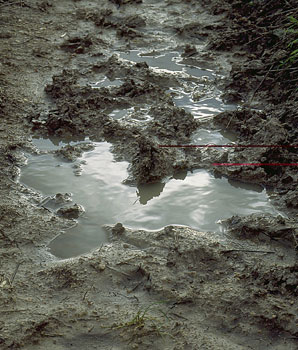
Sustainable sewage sludge
Researchers from the Institute of Chemical Engineering, Biotechnology and Environmental Technology are part of a new research cooperation in recycling of the vital element, phosphorus, from sewage sludge.
Phosphorus is becoming a scarce resource. This poses a big problem as phosphorus is essential to all living beings and its known deposits are limited. A new three-year project, which has recently been granted 14 million Danish kroner from the Danish National Advanced Technology Foundation, will work on methods for recycling phosphorus from residual projects.
Researchers from the Institute of Chemical Engineering, Biotechnology and Environmental Technology (KBM) have joined forces with the Technical University of Denmark (DTU) and the companies NORD and Krüger to extract phosphorus from sewage sludge ashes. This would potentially replace part of the current consumption of raw phosphorus from mining.
Important to nature
‘Shortage of phosphorus will be a consequence should we continue mining as usual. And that must be avoided. Therefore we are very pleased to participate in this project, which takes responsibility for finding a sustainable solution to the future phosphorus supply‘, says Associate Professor Haiyan Qu from KBM.
The biggest challenge to the recycling of phosphorus from ashes is the large amount of heavy metals, which often exceeds current rules and regulations on fertilisers on farm land and in industrial processes. NORD, who is heading the project, has succeeded in finding a solution that eliminates the heavy metals and enables the making of high-purity phosphorus.
60 million tons of sewage sludge
The project has great potential nationally as well as internationally:
‘In Europe alone we produce more than 60 million tons of sewage sludge every year, which is spread on fields or deposited. By recycling phosphorus from the ashes it is possible to use the sludge for energy production and recycle the phosphorus without worrying about heavy metals and environmentally injurious substances’, says Haiyan Qu.
Develops usable technologies
Professor Sven G. Sommer from KBM also looks forward to participating in this visionary project:
‘It will contribute to a necessary and robust recycling of phosphorus that will reduce the environmental impact on our aquatic environment, which is one of the core research areas of the institute. Participating in the project will strengthen the institute’s crystallisation laboratory, which with a high degree of professional expertise can develop technologies for a broad spectrum of biotechnologies’, he says.
For further information please contact
Associate Professor Haiyan Qu: tel. +45 6550 7494 / mobile 2135 6304 / email: haq@kbm.sdu.dk
About the project
Title: Recycling high-purity phosphorus from sewage sludge ash
Budget: 27 million Danish kroner, incl. the investment of 14 million from the Danish National Advanced Technology Foundation
Duration: 3 years
Parties: NORD (previously Kommunekemi), Krüger a/s, DTU Civil Engineering and the Institute of Chemical Engineering, Biotechnology and Environmental Technology.